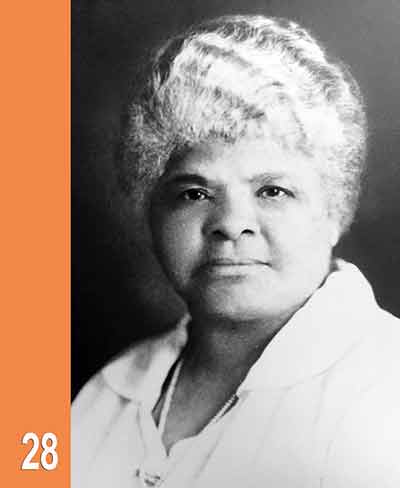Ida B. Wells
Induction Year: 1985
Lived: 1862-1931
Papers:
Free Speech, Memphis; New York Age Conservator, Chicago
Ida B. Wells was a courageous and outspoken woman who conducted an incredible crusade against black oppression on the pages of newspapers and the lecture platform from the post-Reconstruction period until her death in 1931. In a time when women, no matter what their color, were supposed to be like children--seen but not heard--Miss Wells turned her scathing pen and tart tongue on racial inequality and injustice.
Born into slavery in rural Mississippi six months before the signing of the Emancipation Proclamation in 1862, she was forced to assume the responsibility for six brothers and sisters when her parents died in the yellow fever epidemic of 1878. She turned to teaching in a rural black school in Mississippi and later in the Memphis black schools.
By 1887, she had begun to write for a small black newspaper in Memphis, the Free-Speech and Headlight. Other black newspapers across the nation began to pick up her articles. Later she took her life savings and bought the newspaper, shortened the name to Free Speech and promptly lost her job as a teacher because she wrote articles criticizing the Memphis Board of Education for separate but grossly unequal schools. She became a full-time writer and editor. Under the pen name "lola" she began publishing details about the unfair treatment of blacks. Her articles appeared in the Jackson (Tenn.) Christian Index, the Chattanooga Justice, and dozens of other black papers in such cities as Detroit, Kansas City, Louisville, Little Rock and Indianapolis.
She demonstrated the power of her pen after three young black businessmen were lynched in Memphis in 1892. She urged blacks to leave the city. Many took her advice and migrated to Arkansas and Oklahoma. She followed them and wrote about their resettlement. She also urged those who remained to boycott the streetcars. And many blacks walked to work. Her newspaper was blamed for paralyzing downtown business.
But it was an editorial she wrote, defending black men against what she believed to be unjust charges of raping white women, that led to the downfall of the Free Speech. She was at a church meeting in Philadelphia when the editorial ran. An angry mob sacked her office, destroying the type as well as the furnishings and posting a warning on the office door that she faced a similar fate. Ida B. Wells did not return to Memphis. She took a job as a writer for the New York Age and continued to investigate and write about lynchings throughout the United States. In 1895, she compiled the first statistical pamphlet on lynchings in the nation.
She took her crusade to England, and her speeches there were influential in formation of the powerful British Anti-Lynching Society. Miss Wells moved to Chicago, where she married another crusader, Ferdinand L. Barnett, a lawyer and newspaper man. They continued their campaign for equal justice for blacks through their newspaper the Conservator. However, after the second of their four children was born, she retired from the newspaper. But she could not stop being a crusader. She formed clubs, settlement houses and education organizations to help blacks in Chicago. She was active in church activities and organized the first black women's political organization, the Alpha Sufferage Club. She even ran for the Illinois State Senate in 1930, but finished third. The following year, she died after a brief illness.
Ida B. Wells will be remembered more for her fight against the lynchings of blacks and for her passionate demand for justice and fair play for them. But perhaps the most remarkable thing about her is not that she fought lynchings and other forms of cruelty, inhumanity and injustice. Rather, she fought a lonely and almost single-handed fight, with the dedication of a crusader, long before men or women of any race entered that arena.
